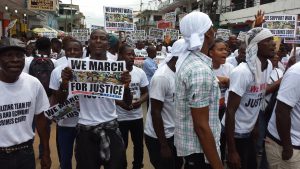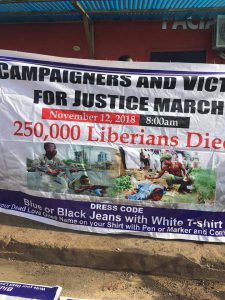MONROVIA – “We are the victims; we cannot get tired!” “We want justice!” and “Yor leave us oh! Dah justice we want!” were among an estimated 4,000 Liberians who gathered early Monday morning to memorialize the deaths of 250,000 thousand people who died during the Liberian civil war. The march, through the streets of Monrovia, also supported the call for the establishment of a war crimes court.
This story first appeared on FrontPageAfricaOnline as part of a collaboration for the West Africa Justice Reporting Project.

Emmanuel Pajebo carried photographs of his parents on the march. It has been 28 years since they were killed in their home in Gardnersville along with everyone in his family. Pajebo, then a teenager, was only spared because he went to buy food. He is now the sole survivor from his family. “Today I am alone in this world. No brother, no sister! 9 people, all massacred in cold blood because we are Sapo (tribe).” Pajebo blames Prince Johnson and his breakaway Independent National Patriotic Front of Liberia. “Prince Johnson and his soldiers killed all my family.”
Twenty-eight years on Pejabo said the anger and pain is still raw. He has three children. He frequently tells them about their slain aunts, uncles and grandparents. “I do not feel lucky to be living. It is a sorrowful life, nobody to tell what is going on in your life. I want justice for them all.”
Pajebo was one of thousands of Liberians who ignored the heat to protest on Monday. Protestors presented their petition at the United States Embassy, the European Union Offices, and the Office of President George Weah. The petition was presented by March organizers Adama Dempster and Emmanuel Savice. Archie Bernard, legal advisor to the president, received the petition and promised to deliver it to the president.
Savice called on the government to act now. “My two brothers and one sister were killed during the war. We want justice. We will not rest until something is done by the Liberian government. Finances should not be the concern of the government. Sierra Leone did not have the money to pay for their own war crimes court. They international community just need the Liberia government take the first step.”

The November 12 date for the March was chosen because of its significant place in Liberian history. It is exactly 33 years ago that Thomas Quiwonkpa and men mostly loyal to his Gio tribe, staged the 1985 coup d’etat aiming to unseat former President Samuel K. Doe.
The coup failed. Doe emerged victorious. In retaliation members of Doe’s tribe murdered many innocent Gio and Mano people. But there was also another side of that story. When Doe and his loyalists were in hiding, Krahn people, who had no connection with Doe were also killed.
It is this dark and gruesome past of bloodletting that the organizers of the Justice March decided to bring alive.
“We want to speak to the conscience of the Liberian people. So that, through our protest action, we can relive what happened and remember all the innocent people that died that day,” said Franklin Wesseh of the organizers of the Campaigners for Justice.
The protest brought together people from all walks of life, most claiming to be victims of the war. One such protester is Prince Seah. Seah was only 12 years old when he was recruited by the National Patriotic Front of Liberia (NPFL). Young and inexperienced, he lost one of his legs while fighting. He now begs on the streets to survive. He too wants justice.
“I beg everyday just to eat because I am crippled. Every day they (commanders/bosses) pass by me on the streets. They don’t care,” said Seah “I see their children going to school, my heart can be burning. I need justice because my life is destroyed.”
As the protest progressed other people joined in. From the sidewalks along the streets, some criticized their actions, citing security concerns. Henry Tarh was also a child soldier who lost one arm but he is ready to move on. “You want justice for whom?” he asked. “Look at them. They are opposition people who do not want this government to succeed, they just want another war to come.”
Wesseh said people like Tarh are just repeating rhetoric from the current Liberian government. “The government must remember that we still have that voting rights. If they want to play politics with this war crimes court issue they must know that a day will come when they will need this large crowd to vote for them.”
Pundits say they are watching to see what comes out of the protest considering its connection to the same date in 1985. This is a reference to the fact that the coup was short-lived. Since that time some analysts have accused Quiwonkpa of waving a white flag in a bid to oust Doe. Yet others pointed to the lack of support as key reasons why Doe was able to regroup and foil the coup.
Supporters of a war crimes court in Liberia hope their current campaign will have better luck than Quiwonkpa’s coup.
